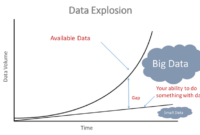Big Data storage solutions revolutionize the way businesses handle massive amounts of data. From data lakes to NoSQL databases, these solutions play a crucial role in various industries. Dive into the world of efficient data storage with this comprehensive guide.
Overview of Big Data Storage Solutions

Big data storage solutions refer to the technologies and strategies used to store and manage large volumes of data generated by businesses, organizations, and industries. These solutions are essential for handling the massive amounts of data produced in today’s digital age.
Efficient data storage is crucial for big data applications as it allows organizations to store, manage, and analyze vast amounts of structured and unstructured data in real-time. By implementing effective storage solutions, businesses can extract valuable insights, improve decision-making processes, and enhance overall operational efficiency.
Importance of Efficient Data Storage
- Ensures quick access to data: Efficient storage solutions enable organizations to access and retrieve data quickly, allowing for timely decision-making and analysis.
- Scalability: Big data storage solutions are designed to scale horizontally and vertically, accommodating the growing volume of data without compromising performance.
- Data security: Proper storage solutions help in securing sensitive data, protecting it from unauthorized access, breaches, and cyber threats.
- Cost-effectiveness: By optimizing storage infrastructure, organizations can reduce costs associated with data management and storage, maximizing ROI.
Industries Relying on Big Data Storage Solutions
- Finance: Financial institutions utilize big data storage solutions to analyze market trends, detect fraud, and manage risk effectively.
- Healthcare: Healthcare providers leverage these solutions to store and analyze patient data, enhance treatment outcomes, and improve operational efficiency.
- Retail: Retailers use big data storage solutions to personalize customer experiences, optimize inventory management, and forecast demand accurately.
- Telecommunications: Telecom companies rely on these solutions to manage network traffic, improve service quality, and enhance customer satisfaction.
Types of Big Data Storage Solutions

Data storage is a crucial component of any big data strategy, and there are different types of storage solutions available to handle large volumes of data efficiently. Let’s compare and contrast some of the most commonly used options: data lakes, data warehouses, and NoSQL databases.
Data Lakes
Data lakes are designed to store vast amounts of raw data in its native format, without the need for predefined schemas. This flexibility makes them ideal for storing unstructured and semi-structured data. However, data lakes can become a “data swamp” if not properly managed, leading to issues with data quality and governance.
- Scalability: Data lakes can scale horizontally to accommodate petabytes of data, making them suitable for handling massive volumes of information.
- Pros: Flexibility in storing diverse data types, cost-effective storage solution, ability to perform complex analytics on raw data.
- Cons: Data quality and governance challenges, potential for data silos and duplication, requires skilled data engineers for maintenance.
Data Warehouses, Big Data storage solutions
Data warehouses are structured repositories that store data from various sources after processing and transforming it into a consistent format. They are optimized for complex queries and analytics, making them suitable for business intelligence and reporting purposes.
- Scalability: Data warehouses can scale vertically by adding more resources to improve performance, but may have limitations in handling extremely large datasets.
- Pros: High performance for complex queries, data consistency and integrity, ability to support structured data analysis.
- Cons: Costlier than data lakes, limited flexibility for storing unstructured data, may require data modeling and ETL processes.
NoSQL Databases
NoSQL databases offer a flexible and scalable solution for storing and retrieving unstructured and semi-structured data. They are designed to handle high-velocity data with schema-less architecture, making them suitable for real-time applications and distributed environments.
- Scalability: NoSQL databases can scale horizontally to distribute data across multiple nodes, enabling seamless expansion as data volumes grow.
- Pros: High performance for read and write operations, flexible schema design, ability to handle diverse data types.
- Cons: Lack of ACID compliance in some cases, may require more complex query patterns, potential for data inconsistencies without careful design.
Challenges in Big Data Storage

When it comes to storing and managing large volumes of data, organizations often face several challenges that can impact the efficiency and effectiveness of their big data storage solutions. These challenges range from data security and privacy concerns to issues related to data integration and data quality.
Data Security and Privacy Concerns
Organizations handling big data must prioritize data security and privacy to protect sensitive information from potential breaches and unauthorized access. With the increasing amount of data being stored, there is a higher risk of cyber threats and security vulnerabilities. Implementing robust security measures, encryption techniques, access controls, and regular security audits are crucial to safeguarding data in big data storage solutions.
Data Integration Challenges
One of the common challenges in big data storage is the integration of data from various sources and formats. Organizations often deal with disparate data sources that need to be consolidated and integrated for meaningful analysis. Data integration challenges can arise due to inconsistencies in data formats, quality issues, and compatibility issues between different systems. Implementing data integration tools and technologies can help organizations streamline the process and ensure data consistency across the board.
Data Quality Issues
Maintaining data quality is essential for deriving accurate insights and making informed decisions based on big data. However, ensuring data quality can be a challenge due to the sheer volume of data being stored and the complexity of data sources. Poor data quality can lead to inaccurate analysis and flawed business decisions. Organizations can address data quality issues by implementing data governance practices, data cleansing techniques, and data validation processes to improve the overall quality of data stored in big data solutions.
Best Practices for Implementing Big Data Storage Solutions
Implementing big data storage solutions requires careful planning and consideration to ensure optimal performance, cost-effectiveness, reliability, availability, and disaster recovery. By following best practices, organizations can make the most of their big data storage environments.
Key Considerations for Selecting a Big Data Storage Solution
When selecting a big data storage solution, organizations should consider factors such as scalability, data security, compliance requirements, ease of integration with existing systems, and vendor support. It is essential to choose a solution that can handle the volume, variety, and velocity of data while meeting business needs effectively.
Strategies for Optimizing Storage Performance and Cost-Effectiveness
To optimize storage performance and cost-effectiveness, organizations can implement strategies such as data tiering, compression, deduplication, and caching. By tiering data based on usage patterns and importance, organizations can allocate resources more efficiently and reduce costs. Compression and deduplication techniques help minimize storage space requirements, while caching improves data access speeds.
Tips for Ensuring Data Reliability, Availability, and Disaster Recovery
Ensuring data reliability, availability, and disaster recovery in big data storage environments is crucial for business continuity. Organizations can achieve this by implementing data replication, backup, and disaster recovery plans. Regular testing of backup and recovery processes is essential to identify and address any potential issues proactively. Additionally, encryption and access controls help protect data integrity and confidentiality.
In conclusion, Big Data storage solutions are paramount for organizations looking to harness the power of data. By implementing best practices and overcoming challenges, businesses can optimize their data storage environment for success.
Business reporting plays a crucial role in enhancing decision-making through data. By analyzing and interpreting key metrics, businesses can gain valuable insights that drive strategic planning and growth. Utilizing tools like business intelligence software can help streamline the reporting process and provide real-time data for more informed decisions. Learn more about Business reporting Enhancing Decision-Making Through Data to stay ahead in today’s competitive market.
Analytical dashboards are essential in unlocking data insights for business success. These interactive tools allow users to visualize complex data sets, identify trends, and make data-driven decisions quickly. By incorporating customizable widgets and KPIs, businesses can monitor performance in real-time and adjust strategies accordingly. Discover more about Analytical Dashboards Unlocking Data Insights for Business Success to optimize your decision-making processes.
Data-driven reports are instrumental in making informed decisions with data. By leveraging analytics and reporting tools, businesses can transform raw data into actionable insights that drive growth and profitability. These reports provide a comprehensive overview of key metrics, enabling stakeholders to identify opportunities and mitigate risks effectively. Explore the benefits of Data-driven reports Making Informed Decisions with Data to elevate your decision-making capabilities.



